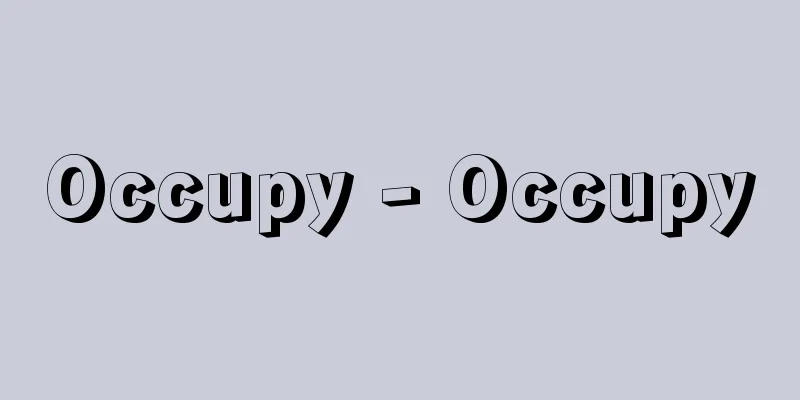Occupy - Occupy

|
A state in which a person has de facto control over something. In other words, possessing something with the intention of using it for one's own benefit (Civil Code Article 180). If one actually resides in a house and has household goods therein, then one is in possession of the house and household goods. In this way, when an object is under one's control, one often has some kind of right (principal interest) that justifies possession, such as ownership, surface rights, pledges, leases, etc. Possession is unique in that it is recognized not only by those who control an object based on such principal interests, but also by those who only have de facto control over an object without principal interests. For example, if a thief has stolen property, or if a person mistakenly holds someone else's property thinking it is their own, they will be protected by law as a possessor, even if they have no reason to acquire ownership. The circumstances under which an object can be said to be in de facto control are determined by social concepts, and cannot be determined physically. For example, a store clerk may temporarily have the goods in the store under his control, but possession is considered to belong to the store owner. Or, when Person A lends or entrusts an object to Person B, in addition to Person B acquiring possession, Person A is also considered to have possession through Person B's possession (with Person B as an agent) (Article 181 of the same law). In this case, Person A does not physically control the object at all, but is protected as a possessor. Person A's possession is called "possession by proxy" or "indirect possession", and Person B's possession is called "possession by himself" or "direct possession". [Yasuyuki Takahashi and Masamitsu Nozawa] PossessionPossessive rights are real rights (Civil Code Articles 180-205) that are recognized as a legal requirement when a person has de facto control over an object, i.e. possession. Possessive rights have the following effects: (1) If B takes something that A possesses and puts it under his control, A can demand the return of the thing from B based on his right of possession. Even if the thing was originally B's property and A took it without permission, and B took it back by force, A's ability to demand the return of the thing has special effect. The purpose of this is to protect the current social order (even if it is an illegal state) and to prohibit individuals from correcting it by force (self-help). In the above example, B's only option for getting his thing back is to sue the court separately for the return of the thing because it is his property (action on the original right). Person A's suit is called a "suit for possession" (Article 197 of the same Act), and there are three types: a "suit for recovery of possession" (Article 200 of the same Act), which demands the return of property that has been taken from possession; a "suit for maintenance of possession" (Article 198 of the same Act), which demands the removal of a disturbance when possession of an item is disturbed; and a "suit for preservation of possession" (Article 199 of the same Act), which demands measures to prevent disturbance of possession. (2) Regardless of the existence of a right of possession, if a person who possesses a thing claims to be the owner, that person is presumed to be the owner (Article 188 of the same law). In other words, if B claims that an object possessed by A is his/hers, B must actively prove that he/she is the owner, and as long as he/she cannot prove it, A will be safe (A does not need to clarify the basis for possession). However, this only applies to movable property, and in the case of real property, it is considered that registration plays this role instead of possession. (3) If B buys a movable property believing that A, who is in possession of the movable property, is its owner, B will acquire ownership of the movable property even if C is actually the owner and A is merely the borrower or caretaker. C will not be able to demand the return of the property from B. This is called "immediate acquisition" or "acquisition in good faith" (Article 192 of the same law). When buying or pawning a movable property, if one checks whether the other party is really the owner, the transaction will not go smoothly, so this system was recognized at the expense of the true owner and plays an important role in ensuring the safety of movable property transactions. However, this only applies to movable property, not real estate, and it should be noted that with regard to securities such as bills and checks, a person in the position of B in the above example is more protected. (4) The system of “prescription”, which allows one to acquire real rights by possessing an object for a long period of time, is also one of the effects of possessory rights. [Yasuyuki Takahashi and Masamitsu Nozawa] Quasi-possessionA person who has de facto control over non-physical property rights (claims, patents, copyrights, etc.), for example, a person who has a deposit certificate and a seal, is a quasi-possessor of the deposit claim, and the provisions on possession apply mutatis mutandis to quasi-possession (excluding immediate acquisition; Civil Code Article 205). Furthermore, a payment made in good faith and without negligence to a quasi-possessor of a claim is considered valid (Civil Code Article 478). For example, if a bank believes that a person who brings a deposit certificate and a seal is the depositor, and pays money without any negligence in believing so, the payment is considered valid even if that person is not the true depositor. [Yasuyuki Takahashi and Masamitsu Nozawa] "Seiiji Tanaka, 'Independent Possession and Possession by Other Owners' (1990, Horitsu Bunkasha) " "Nobutaka Takano, 'Ownership and Possession Rights: Basic Theory of Property Law' (2003, Seibundo)" "Masaaki Yasunaga, 'Lectures on Property Rights and Security Property Law' (2009, Yuhikaku)" [References] | | | | |Source: Shogakukan Encyclopedia Nipponica About Encyclopedia Nipponica Information | Legend |
|
物をある人が事実上支配している状態。すなわち、自己のためにする意思で物を所持すること(民法180条)。家屋に現に居住し、その中に家財道具を置いている場合には、家屋と家財道具を占有していることになる。 このように物を自分の支配下においている場合には、所有権、地上権、質権、賃貸権など、占有を正当化するなんらかの権利(本権)をもっていることが多い。占有は、こうした本権に基づいて物を支配している人のほか、本権がなくてただ事実上ある物を支配しているにすぎない人にも認められる点に特色がある。たとえば、泥棒が盗品をもっていたり、ある人が他人の物を誤って自分の物と思ってもっていたりした場合には、所有権取得の理由がなくても、占有者として法律上保護される。 どのような場合に物を事実上支配している状態というべきかは、社会的観念によって決められ、物理的には決められない。たとえば、店員は一時的に店の品物を自分の支配下に置くが、占有は店主にあるものとみなされる。あるいは、甲が乙に物を貸したり預けたりした場合には、乙が占有を取得するほかに、甲も乙の占有を通じて(乙を代理人として)占有しているものとされる(同法181条)。この場合、甲は物理的にはまったく物を支配していないが、占有者として保護される。甲の占有を「代理占有」または「間接占有」、乙の占有を「自己占有」または「直接占有」という。 [高橋康之・野澤正充] 占有権物をある人が事実上支配している状態すなわち占有を法律要件として認められる物権(民法180~205条)が占有権である。占有権には次のような効力が与えられている。 (1)甲が占有している物を乙が奪って自分の支配下に置いた場合、甲は占有権に基づいて、乙に対し物の返還請求をすることができる。たとえその物が元来乙の所有物で、甲がかってに持って行った場合で、乙が実力でその物を奪い返したときでも、甲が自分に返せといえる点に特別の効力がある。現在の社会的秩序(たとえそれが不法な状態であっても)をいちおう保護して、個人が実力でこれを修正すること(自力救済)を禁じようというのがその趣旨である。前記の例で乙が自分の物を取り返すには、所有者は自分の物であるから返せということを別に裁判所に訴えるほかはない(本権の訴え)。甲の訴えを「占有の訴え」といい(同法197条)、占有を奪われた物の返還を要求する「占有回収の訴え」(同法200条)のほか、物の占有が妨害された場合に妨害の排除を要求する「占有保持の訴え」(同法198条)と、占有の妨害予防の措置を要求する「占有保全の訴え」(同法199条)の3種がある。 (2)本権の有無とは関係なしに、物を占有している者が自ら所有者であると主張している場合には、その者は所有者と推定される(同法188条)。すなわち、甲の占有する物を、乙が自分の物であると主張するには、乙自ら所有者であることを積極的に証明しなければならず、その証明ができない限り、甲は安泰だということになる(甲のほうから占有の根拠を明らかにする必要はない)。ただし、これは動産の場合にだけ当てはまることで、不動産の場合には、占有のかわりに登記がこの役割を果たすものと考えられる。 (3)ある動産を占有している甲をその所有者であると信じて、乙がその動産を買った場合には、実は所有者は丙であって甲はその借り主あるいは預かり主にすぎなかったというときでも、乙はその動産の所有権を取得する。丙は乙に所有物の返還請求はできなくなる。これを「即時取得」または「善意取得」という(同法192条)。動産を買ったり質にとったりする場合に、相手方が本当に所有者であるかどうかを調べていては取引がスムーズに行われなくなるので、真の所有者の犠牲において認められた制度で、動産の取引の安全のために重要な機能を営む。ただし、これは動産についてだけで、不動産には認められず、手形・小切手など有価証券については、前記の例の乙の立場にたつ者がより厚く保護されていることは注意しなければならない。 (4)物を長期間占有することによって本権を取得することができるという「時効」の制度も、占有権の効果の一つである。 [高橋康之・野澤正充] 準占有物以外の財産権(債権・特許権・著作権など)を事実上支配している状態で、たとえば預金証書と印をもっている人は、預金債権の準占有者であり、準占有には占有の規定が準用される(即時取得を除く。民法205条)。また、債権の準占有者に対する善意・無過失の弁済は有効とされる(民法478条)。たとえば、銀行が預金証書と印を持ってきた人を預金者だと信じ、かつ、信じることに過失がなく金を払ったら、たとえその人が真の預金者でなくともその支払いは有効とされる。 [高橋康之・野澤正充] 『田中整爾著『自主占有・他主占有』(1990・法律文化社)』▽『鷹巣信孝著『所有権と占有権――物権法の基礎理論』(2003・成文堂)』▽『安永正昭著『講義 物権・担保物権法』(2009・有斐閣)』 [参照項目] | | | | |出典 小学館 日本大百科全書(ニッポニカ)日本大百科全書(ニッポニカ)について 情報 | 凡例 |
Recommend
Akagi Shrine
Located in Miyosawa, Miyagi Village, Gunma Prefect...
Kingdom of Hawaii - Hawaii Kingdom
The Kamehameha Dynasty, which unified the Hawaiian...
Kinbangu sect - Kinbangu sect
...Leader of a messianic religious movement in th...
Haley, A.
...A novel by the contemporary American author Al...
Evening crane
A play by Kinoshita Junji. One act. Published in ...
Subtropical desert
...Arid regions can also be found in high latitud...
How Green Was My Valley
American film. Directed by John Ford. Produced in...
Komaneya - Komake
The family continued as official maki-e artists f...
Mutsu Province - Mutsu no Kuni
Former name of province. It corresponds to the pr...
Christian Brotherhood
…Among these peasant groups, the idea of “Divin...
Nguyen Nhac - Nguyen Nhac
In 1771, together with his two elder brothers, he...
Inauanrat - Inauanrat
…The area is now a completely dry, rugged mountai...
Germanic Mythology - Germanic Mythology
A mythology shared by all the Germanic peoples. H...
Pilgrimage of Grace
A rebellion occurred in the north of England unde...
News agency - Tsuushinsha (English) Wire service
An agency that collects news and news materials a...






![Kamikawa [town] - Kamikawa](/upload/images/67cb3edd06b8f.webp)


